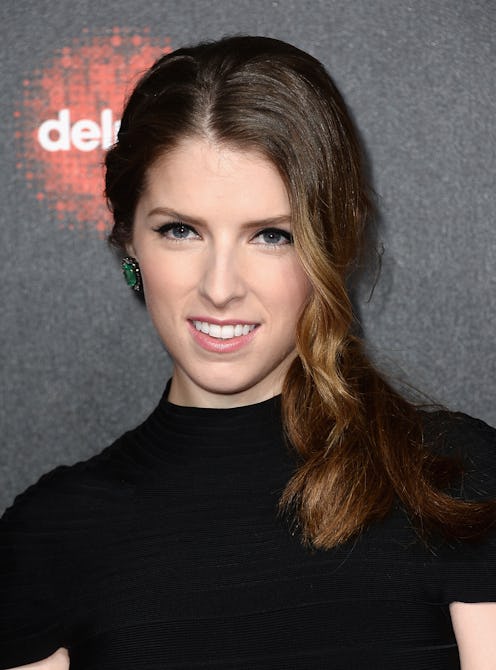Entertainment
Anna Kendrick Breaks Down the Word Feminism
We need to talk about Anna Kendrick, you guys. You see, the Pitch Perfect star has been a national treasure to me for over a year now. Ever since there was that big kerfluffle about her pleasuring herself at Ryan Gosling films (the joke, you missed it), I've been convinced that Kendrick is the best friend I've always wanted to have. (No offense to my real life bestie, obviously, but come on. Kendrick loves Beyoncé more than I do and I love Beyoncé.) However, as if she was somehow convinced I wasn't loving her quite enough, the actress did an interview with The Daily Beast. In it, Kendrick dissects why feminism is a "curse word" and her semantic-based explanation really resonated with me.
"It’s hard because words confuse me sometimes. There isn’t a word for a member of an ethnic minority who is pro equal rights for all races, but there is a word for gender equality—and that’s feminism," she says, after being told that TIME included feminism on a list of potential words to be banned. (Thankfully, TIME later issued an apology for it. Sort of.) "It’s a very female-centric word. I understand that the implication is that 'I’m a woman who supports women' and not 'I’m a person who supports gender equality.' I feel like the word can be appropriated by the wrong people for that reason and misinterpreted by those people, but you just have to fight back and own that word. It’s practically become a curse word... Why are we afraid of that word? It exists and we can’t get rid of it, so let’s fight for it and embrace it."
Shameless praise of Kendrick for being an outspoken feminist aside, she has a point. The introduction of the word feminism into the English language is attributed to philosopher Charles Fourier — at least, according to Wikipedia — and, by way of etymology, it comes from the French word féminisme, which in turn comes from the Latin fēmina, meaning woman. Adding the suffix -ism, according to its dictionary definition, is to "form [a noun] of action or process or result based on the accompanying verb." So, essentially, the word "feminism" literally means "action of/for/about women." In that sense, it is indeed a very female-centric word, as Kendrick points out.
However, the popular misconception of feminism resulting from the belief that it's a movement devoted to female domination and populated by angry, men-hating women yelling at the world neglects the fact that feminism is named after women because it is focused on the advancement of women. Because women are the ones who need to be advanced, in order for there to be gender equality. Traditionally and even currently, men are in more positions of power, their opinions are given more weight, and they even get paid more than women do just for the sheer novelty of being men. As proof, look no further than the fact that despite allegations of sexual abuse being brought against the comedian since 2000, no one truly acknowledged the sexual abuse accusations leveled against Bill Cosby until male comedian Hannibal Buress pointed it out during a set.
My point being that there's a very good, very valid reason for why the feminism movement is named after, and largely focuses on, women, women's issues, women's rights, and the advancement of women in society. However, as Kendrick points out, what gets lost in translation is that feminists want women to advance to be on equal level of importance — socially, politically, economically — as men, not to advance beyond them and cause gender imbalance in society once again. Being a feminist doesn't mean that you hate men or shaving your legs or wearing a bra. However, all of that forms a stigma that modern feminists are still try to dispel or escape so that the movement can continue to grow and change with the times.
Thus, it's always refreshing when a famous celebrity like Kendrick is willing to stand up and point out that it is the misinterpretations of feminism that are causing the movement the most harm than the actual ideals of the movement itself. Feminism isn't a dirty word, it isn't a curse, it isn't something to be ashamed of. And with the number of celebrities who have spoken out to distance themselves from that word, plus the negative connotation the word still holds in modern society, it becomes all the more important that people clarify not only what feminism means but also what feminism means to them. Like any concept, it's open to interpretation on just about every aspect but one — it's about gender equality. Start with believing in that, and you're already a feminist. And that's far from being a bad thing.
Image: WeHeartIt (2)
